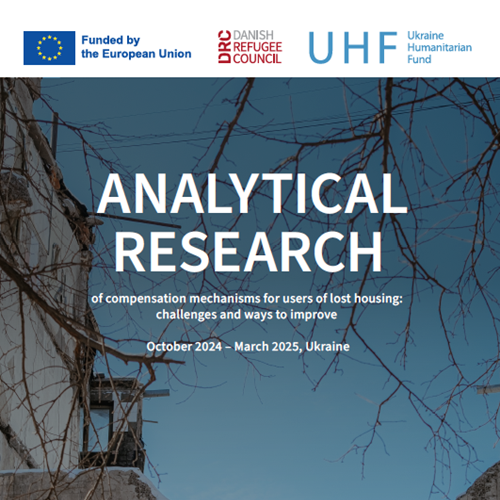Ukraine: Analytical research of compensation mechanisms for users of lost housing
The report analyses Ukraine’s "e-Recovery" programme, highlighting its limited scope in compensating only those with registered property rights, thereby excluding many affected individuals. This raises concerns about discrimination and inequality in access to housing compensation.

Introduction
The war in Ukraine, which escalated into a full-scale invasion in February 2022, caused unprecedented destruction of housing stock, leaving hundreds of thousands of people homeless.
In response to the humanitarian crisis, the government of Ukraine has implemented a national compensation mechanism, launching the “e-Recovery” programme, which aims to support victims by providing interim reparations for damaged and destroyed housing.
However, this mechanism is mainly aimed at homeowners or persons who had properly registered property rights or were in the process of their registration. At the same time, a significant number of housing users, including people who started the privatisation procedure but did not have time to complete it before 24 February 2022, are now excluded from the compensation programme. This creates the risk of a discriminatory approach to the restoration of housing rights and contradicts international standards for the protection of human rights.
The Commissioner for Human Rights of the Verkhovna Rada of Ukraine in the Concept of improving the national system of remedies and support for victims of armed aggression against Ukraine also noted the restrictions established by law on persons entitled to compensation: “Thus, residents of dormitories who do not have documents on the ownership of residential premises, persons who use non-privatized housing, official residential premises ... are not included in the above list [of recipients of compensation], and, accordingly, will not be entitled to compensation”.
Ensuring inclusivity and equitable access to compensation mechanisms is essential. The core element of the rule of law, as one of the key principles of a democratic political regime, is non-discrimination and equality before the law. Consequently, all affected persons are entitled to effective remedies and recovery. The analysis of international experience indicates the need to expand the categories of recipients of compensation and create additional mechanisms for protecting the housing rights of those persons who, due to objective circumstances, were not able to register property in accordance with the established procedure.
The purpose of this study is an analysis of international standards and practices of the European Court of Human Rights on compensation for damaged or destroyed homes, as well as an overview of international approaches that could be adapted to the Ukrainian context, using the example of the conflict in Bosnia and Herzegovina. Furthermore, the study provides for an assessment of the current situation in Ukraine, in particular, determining the potential number of people who remained outside the national compensation mechanism, and considering the prospects of the international compensation mechanism, which is at the stage of formation.
Based on the analysis, recommendations were developed for the Government on possible ways to improve state policy in the field of support for the war-affected population in order to ensure equal access for all victims to compensation for damage, expenses and losses caused.